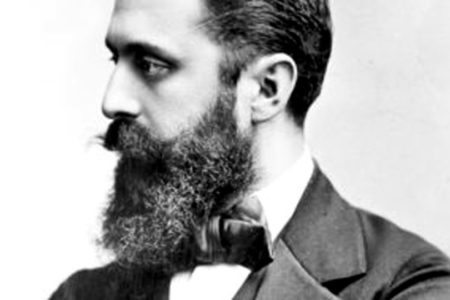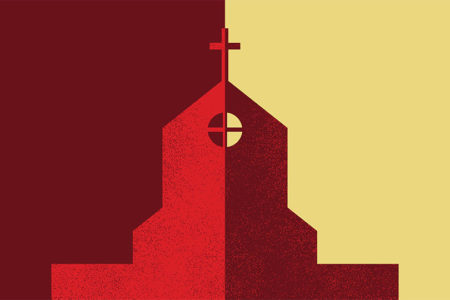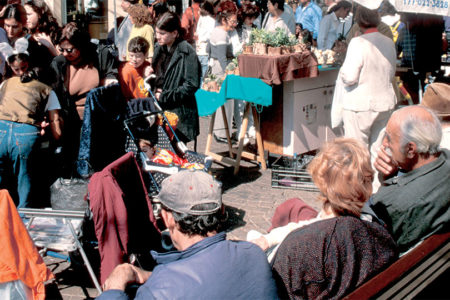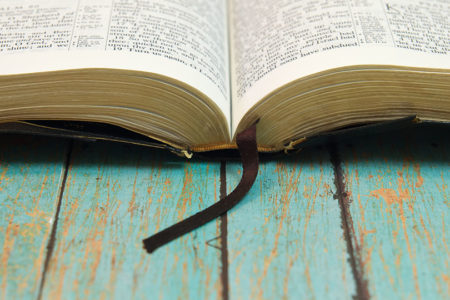From Bill Sutter’s Desk Mar/Apr 2004
As a Jew, I traveled to Israel; and it was Christians who were inspiring me. It was not something I had anticipated.” — Susan Lorell, vice president, Jewish Community Relations Council.
In traveling to Israel recently on a solidarity tour with representatives of our nearby Cherry Hill, New Jersey, Jewish community, we prayed that our lives as Christians would reflect both our commitment to the Bible as God’s Word and the reality of our walk with the Lord.
The Friends of Israel and the Jewish Community Relations Council of Southern New Jersey cosponsored this unique trip—and it was a blessing to us both.
Throughout the land we saw much that the major news organizations virtually ignore. And we witnessed Israel’s uniqueness as the Middle East’s country of compassion and democracy.
Arriving one morning at an absorption center for Jewish Ethiopians, we saw firsthand Israel’s commitment to its immigrants. In Tiberias, on the Sea of Galilee, temporary housing is provided. Hebrew is taught. Educational classes are held for preschool and school-age children, as well as for adults.
The Ethiopians learn a wide range of basic skills for living in Israel’s highly developed society. Unexpectedly, we were on the scene as a bus pulled up from the airport with Ethiopians of all ages who had just arrived in Israel. We witnessed the joyous, emotional reunions of new immigrants with relatives and loved ones who had preceded them. We could feel the emotion and anticipation as others arrived, too, filled with dreams of a better life in the land of their forefathers.
Later the same day we experienced another chapter in the amazing story of Israel’s Ethiopians as we visited the Technion, the high-technology campus in Haifa often described as “Israel’s MIT” (Massachusetts Institute of Technology). We spoke with several of the more than two thousand Ethiopians studying for careers in technology and science, and we saw hundreds more training under a special program for them in science and technology.
One of the students who emigrated from Ethiopia at age thirteen under Israel’s Operation Moses airlift described in fluent English his parents’ dream to be in Jerusalem. He explained how his family walked for twenty-five days in the African desert to a refugee camp before finally being transported to Israel.
From the start of our day meeting new Ethiopian immigrants who knew no Hebrew, to the end of our day at the Technion with well-trained, Ethiopian young adults fluent in Hebrew and English, we witnessed Israel’s comprehensive efforts to help uneducated people from an undeveloped country adjust to the highly developed society of the modern State of Israel.
We also saw Israel’s compassion for its veterans. Since Israel’s inception in 1948, many men and women have been severely injured in their unceasing efforts to protect their homeland from those bent on destroying it. Today Israel’s Zahal Disabled Veterans Organization numbers almost fifty thousand. These members are assisted in their rehabilitation and hope someday to resume normal living—physically, mentally, and socially.
While visiting the Zahal Center in Jerusalem, we met Arik Vamosh, the husband of our Israeli guide, Miriam. Arik was permanently disabled in the 1973 Yom Kippur War during a tank battle in the Sinai Peninsula. He pointed out how the center uses its gymnasium, swimming pool, auditorium, treatment and fitness rooms, classrooms, tennis courts, and other supportive facilities to work toward fully integrating the veterans back into society.
Though in a wheelchair all of these years, we noticed how little Arik spoke of himself and how much he spoke of the many other disabled Israeli veterans needing help.
Our tour not only witnessed the compassion of Israel’s institutions and its people, but we also observed a dynamic democratic government—the only such democracy in the midst of a sea of twenty-two Arab dictatorships.
Arriving at the Arab/Druze village of Ussafiya near Haifa, we met with a Druze leader and former member of Israel’s parliament, the Knesset. He described Israel’s hundred thousand Druze as Arabs who are uniquely “super loyal to the State of Israel.”
We were in Ussafiya on election day, and the Arab men and women were voting as full participants in Israel’s democratic process, a privilege afforded to all of Israel’s 1.2 million Arabs. As our bus wound its way through the streets of this Druze village we noted the festivities of election day and returned the smiles, waves, and greetings of the village children.
Later we were guests at the Knesset in Jerusalem, which stands as a symbol of Jewish sovereignty and dedication to democracy. Sitting in the visitors’ gallery, we viewed the often-heated debates of its elected members. An outspoken Arab member was at the lectern berating the State of Israel. In what Arab country of the Middle East could such an exchange happen? We were experiencing democracy in action in a region of the world that is no friend of democratic institutions.
Eight days with our Jewish friends provided wonderful times for interacting and sharing. We could not help but feel the vital, living connection Jewish people have with Israel as their homeland. Their observations throughout our trip enriched our lives. We, in turn, put 1 Peter 3:15 to work through the many opportunities we had to reflect the hope we find in the Bible and in the Lord Himself:
But sanctify the Lord God in your hearts, and be ready always to give an answer to every man that asketh you a reason of the hope that is in you, with meekness and fear.
Alan Respler, executive director of the Jewish Community Relations Council of Southern New Jersey, shared his thoughts about this trip with The Friends of Israel: “My wife and I were moved by the warm, positive reactions of the Christians that permeated everything we did. We were overwhelmed by the expressions of solidarity and commonality with Israel and the Jewish people.”
Everyone lamented the trip coming to an end. However, meaningful new friendships will continue. And for that, we praise our Lord.







